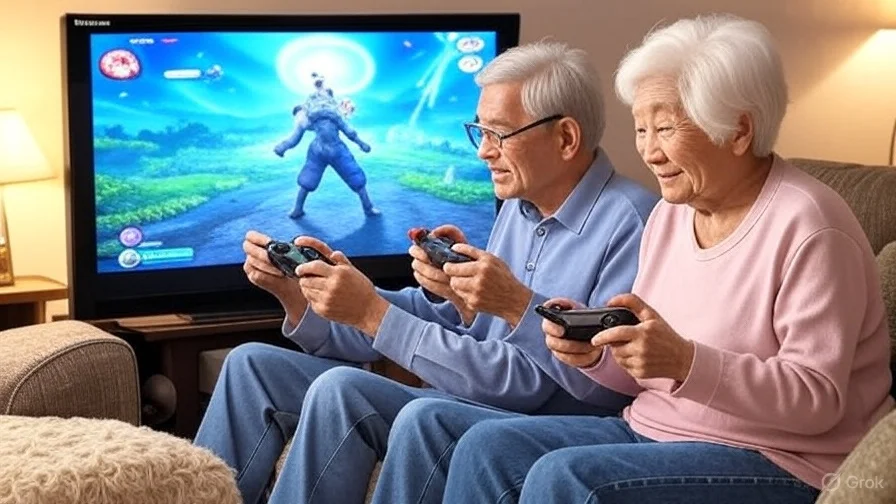Game On: How Exergames Could Revolutionize Cognitive Health for Seniors
In an era where technology permeates every facet of our lives, it’s no surprise that video games are finding their place in unexpected arenas – specifically, the realm of cognitive health. Recent groundbreaking research indicates that exergames, or active video games, may hold the key to enhancing memory, focus, and overall cognitive function in older adults. This article delves into the latest scientific findings, explores the potential benefits, and examines how these interactive games could revolutionize the way we approach brain health in our later years.

The Rise of Exergames: Bridging Fitness and Cognitive Training
The concept of exergames is simple: combine physical exercise with mental challenges within a video game format. These games often involve movement, balance, and reaction time, all while engaging the player’s cognitive abilities. The underlying principle is that by stimulating both the body and the mind simultaneously, exergames can provide a more holistic and effective approach to maintaining and improving cognitive health. This approach is particularly promising for seniors, as it offers a fun and engaging way to stay active while potentially mitigating the effects of age-related cognitive decline.
The development of exergames started more than three years ago, aiming to provide an alternative to conventional medications, promoting both physical activity and cognitive training at the same time. These games are designed to challenge players’ memory, attention, and spatial reasoning skills while encouraging physical activity, making them a unique tool in the fight against cognitive decline. The versatility of exergames allows for personalized training regimens that can be adapted to the individual needs and abilities of each player.
Unveiling the Science: Studies Show Cognitive and Structural Brain Changes
Two significant studies, conducted in Switzerland and published in the Alzheimer’s & Dementia and Alzheimer´s Research & Therapy journals, provide compelling evidence of the benefits of exergames. These studies focused on older adults with mild cognitive impairment, a condition that often precedes dementia. The participants, with an average age of 73, engaged in a 12-week training program using exergames. The results were remarkable, demonstrating significant improvements in cognitive performance and structural changes in the brain.
The studies involved participants playing exergames at home for 25 minutes, five times a week. These games required them to solve tasks that demanded specific movements and responses, combining physical activity with mental challenges. Some tasks included memory exercises. The data collected showed that participants using the exergames exhibited notable improvements in memory and other cognitive functions. Those in the control group, who continued with their usual routines, experienced a decline, a normal occurrence in the absence of intervention. This highlights the potential of exergames to not only maintain but also enhance cognitive abilities.
The Brain on Exergames: What the Scans Reveal
The second phase of the Swiss studies took an even deeper look, using MRI scans to examine the impact of exergames on brain structure. The results were striking. Participants who played the exergames showed an increase in the volume of the hippocampus and thalamus, crucial brain regions for memory and cognitive function. They also showed improvements in the anterior cingulate cortex and the prefrontal cortex, which play vital roles in complex thinking and decision-making.
These findings suggest that exergames can stimulate neuroplasticity – the brain’s ability to reorganize itself by forming new neural connections throughout life. The fact that these structural changes were observed in just three months underscores the potential of these games to counteract age-related cognitive decline and even to improve cognitive function. The implications of these changes are significant, hinting at the possibility that exergames could be used as a preventative measure against dementia.
Beyond the Brain: Enhanced Agility and Everyday Function
The benefits of exergames extend beyond the realm of cognitive function. Participants in the Swiss studies reported feeling more agile and capable in their daily activities. They found it easier to perform tasks like shopping, having conversations, and managing stress. This is a crucial aspect of the quality of life for older adults. It suggests that exergames can not only improve cognitive abilities but also enhance physical function and overall well-being, promoting a sense of independence and self-sufficiency.
The combination of mental and physical training inherent in exergames is a key factor in these positive outcomes. Engaging the body and mind simultaneously leads to a synergistic effect, where the benefits of exercise and cognitive training are amplified. This also underscores the need for holistic approaches to healthcare. Consider exploring our article on Best Exercises for Seniors: Stay Active and Thrive After 60 to discover how physical activity complements cognitive function.
Exergames: A Complement to Conventional Treatments?
The results of the Swiss studies open the door to the idea of using exergames not just as a palliative measure, but as a tool to modify the course of cognitive decline. This raises the prospect of integrating exergames into existing treatment plans or using them as a preventive measure. The potential benefits are substantial, especially considering the accessibility and safety of these games.
However, it is important to note that the scientists involved in the research emphasize the need for more studies to fully understand the long-term effects of exergames. The team is already planning further research to assess the sustainability of these positive results and to determine if these games can delay or prevent the onset of dementia. This ongoing research is crucial to understanding the full potential of exergames and their integration into healthcare strategies.
The Future of Cognitive Health: What’s Next?
The emerging field of exergames holds tremendous promise for improving cognitive health in older adults. The early results are encouraging, but further research is needed to explore the long-term effects and optimal usage of these games. As the technology continues to evolve, we can expect even more sophisticated and engaging exergames to emerge.
The development of exergames is a positive step towards innovative and non-pharmaceutical treatments for conditions like Alzheimer’s disease. We’ll continue to monitor this exciting field and provide updates as more research becomes available. Considering the impact of health and the potential of technology, the next step is to be aware of these advances and find ways to make them a part of your life. The future of cognitive health is promising, and exergames are leading the charge. Consider reading our article about Brain Regeneration Breakthrough: New Pill Promises Stroke Recovery and More for additional information.

Taking Action: How to Explore Exergames
If you are interested in exploring exergames, there are several avenues to consider:
- Consult your healthcare provider: Discuss your interest in exergames with your doctor or a healthcare professional. They can assess your individual needs and provide guidance on the most suitable options.
- Explore available exergames: There are a variety of exergames available for different platforms, including gaming consoles, computers, and mobile devices. Research different games and choose those that align with your interests and abilities.
- Start slowly: Begin with shorter gaming sessions and gradually increase the duration and intensity as you become more comfortable.
- Monitor your progress: Keep track of your cognitive function and physical activity levels to assess the effectiveness of exergames.
- Combine with a holistic approach: Incorporate other brain-healthy habits, such as a balanced diet, regular exercise, and social interaction, to maximize the benefits of exergames.
Conclusion: A New Era of Cognitive Wellness
The research on exergames demonstrates that these interactive games can offer significant benefits for cognitive health in older adults. By combining physical activity with mental challenges, exergames provide a holistic approach to brain training that can enhance memory, focus, and overall cognitive function.
The Swiss studies revealed structural changes in the brain, indicating the potential of exergames to not only maintain but also improve cognitive abilities. As technology advances and more research emerges, exergames could become an essential part of promoting cognitive wellness in the aging population. The future of cognitive health is dynamic and full of possibilities. Stay active and informed, and take charge of your brain health. Consider reviewing our guide on Fitness After 40: The Ultimate Guide to Cardio and Strength Training for maintaining a














1 comment